新概念英语第一册 Lesson 51-54讲解和练习
- 格式:doc
- 大小:52.50 KB
- 文档页数:4
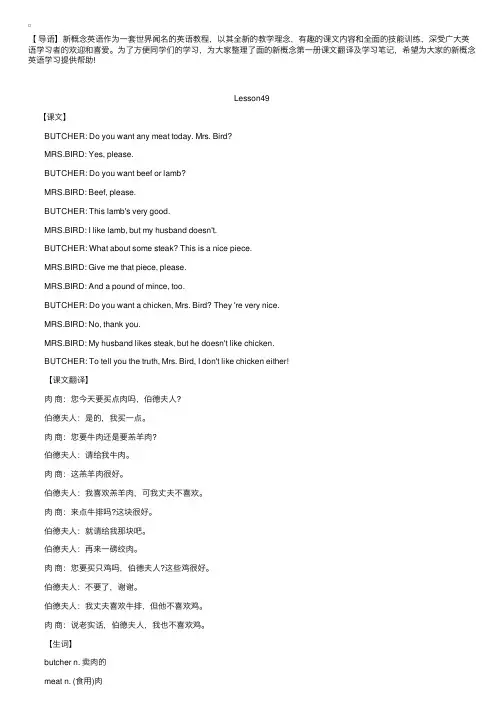
【导语】新概念英语作为⼀套世界闻名的英语教程,以其全新的教学理念,有趣的课⽂内容和全⾯的技能训练,深受⼴⼤英语学习者的欢迎和喜爱。
为了⽅便同学们的学习,为⼤家整理了⾯的新概念第⼀册课⽂翻译及学习笔记,希望为⼤家的新概念英语学习提供帮助!Lesson49【课⽂】 BUTCHER: Do you want any meat today. Mrs. Bird? MRS.BIRD: Yes, please. BUTCHER: Do you want beef or lamb? MRS.BIRD: Beef, please. BUTCHER: This lamb's very good. MRS.BIRD: I like lamb, but my husband doesn't. BUTCHER: What about some steak? This is a nice piece. MRS.BIRD: Give me that piece, please. MRS.BIRD: And a pound of mince, too. BUTCHER: Do you want a chicken, Mrs. Bird? They 're very nice. MRS.BIRD: No, thank you. MRS.BIRD: My husband likes steak, but he doesn't like chicken. BUTCHER: To tell you the truth, Mrs. Bird, I don't like chicken either! 【课⽂翻译】 ⾁商:您今天要买点⾁吗,伯德夫⼈? 伯德夫⼈:是的,我买⼀点。
⾁商:您要⽜⾁还是要羔⽺⾁? 伯德夫⼈:请给我⽜⾁。
⾁商:这羔⽺⾁很好。
伯德夫⼈:我喜欢羔⽺⾁,可我丈夫不喜欢。
⾁商:来点⽜排吗?这块很好。
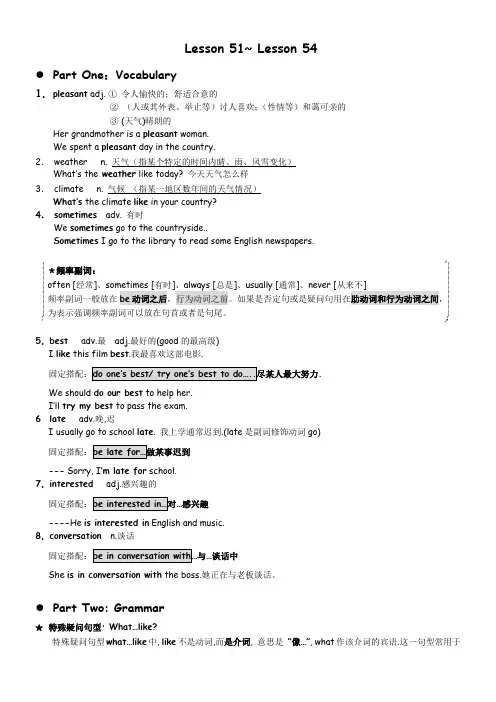
Lesson 51~ Lesson 54●Part One:Vocabulary1.pleasant adj. ①令人愉快的;舒适合意的②(人或其外表、举止等)讨人喜欢;(性情等)和蔼可亲的③ (天气)晴朗的Her grandmother is a pleasant woman.We spent a pleasant day in the country.2.weather n. 天气(指某个特定的时间内睛、雨、风雪变化)What’s the weather like today? 今天天气怎么样3.climate n. 气候(指某一地区数年间的天气情况)What’s the climate like in your country?4. sometimes adv. 有时We sometimes go to the countryside..Sometimes I go to the library to read some English newspapers.*频率副词:often [经常]、sometimes [有时]、always [总是]、usually [通常]、never [从来不]频率副词一般放在be动词之后,行为动词之前。
如果是否定句或是疑问句用在助动词和行为动词之间,为表示强调频率副词可以放在句首或者是句尾。
5.best adv.最adj.最好的(good的最高级)I like this film best.我最喜欢这部电影..We should do our best to help her.I’ll try my best to pass the exam.6 late adv.晚,迟I usually go to school late. 我上学通常迟到.(late是副词修饰动词go)--- Sorry, I’m late for school.7.interested adj.感兴趣的…感兴趣----He is interested in English and music.8.conversation n.谈话与…谈话中She is in conversation with the boss.她正在与老板谈话。
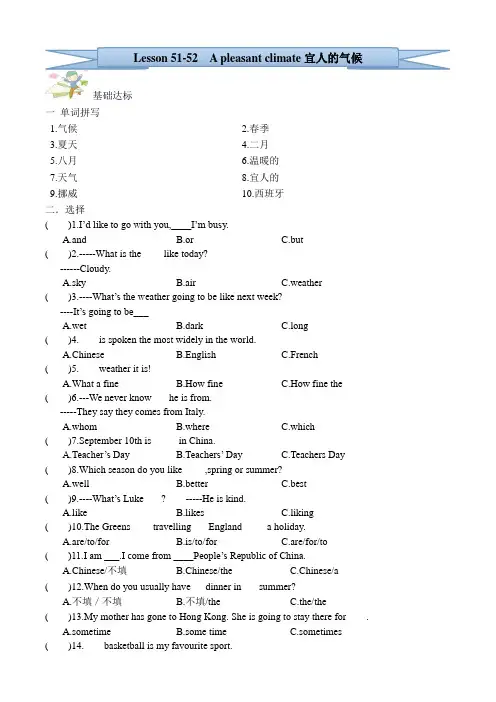
Lesson 51-52 A pleasant climate宜人的气候基础达标一单词拼写1.气候 _______________________2.春季_________________________3.夏天 _______________________4.二月_________________________5.八月 _______________________6.温暖的_______________________7.天气 _______________________8.宜人的_______________________9.挪威 _______________________ 10.西班牙______________________ 二.选择( )1.I’d like to go with you,____I’m busy.A.andB.orC.but( )2.-----What is the ____like today?------Cloudy.A.skyB.airC.weather( )3.----What’s the w eather going to be like next week?----It’s going to be___A.wetB.darkC.long( )4.____is spoken the most widely in the world.A.ChineseB.EnglishC.French( )5.____weather it is!A.What a fineB.How fineC.How fine the( )6.---We never know ___he is from.-----They say they comes from Italy.A.whomB.whereC.which( )7.September 10th is _____in China.A.Teacher’s DayB.Teachers’ DayC.Teachers Day( )8.Which season do you like ____,spring or summer?A.wellB.betterC.best( )9.----What’s Luke ___? -----He is kind.A.likeB.likesC.liking( )10.The Greens ____travelling ___England_____a holiday.A.are/to/forB.is/to/forC.are/for/to( )11.I am ___.I come from ____People’s Republic of China.A.Chinese/不填B.Chinese/theC.Chinese/a( )12.When do you usually have___dinner in ___summer?A.不填/不填B.不填/theC.the/the( )13.My mother has gone to Hong Kong. She is going to stay there for____.A.sometimeB.some timeC.sometimes( )14.____basketball is my favourite sport.A.TheB.ThisC.不填( )15.A lot of ____people in the USA have come back to _____for a visit these year.A.China’s/ChinaB.Chinese/ChinaC.Chinese’s/Chinese能力提升三阅读Today is Sunday. All of us go to school early, but we have no class. Our teachers are going to take us to the zoo. We take buses there. We get there at nine thirty.How beautiful the zoo is!There are many trees, some hills, and a big lake. It’s spring now, so the flower are coming out. There are many people there, too. We like to watch the monkeys. They are playing on the hills or having oranges, apples and bananas. We are having a good time there. We leave the zoo at there in the afternoon.( ) 1.The students get to the zoo in the afternoon.( ) 2.The students have lunch at home.( ) 3.They go to the zoo because today is Sunday and they have no classes.( ) 4.They stay in the zoo for four hours.( ) 5.They go to the zoo by bus.四连词成句1.you , do, come, where, from_________________________________________________2.like, climate, in, country, your, what’s, the_________________________________________________3.pleasant, always, it’s_________________________________________________4.snows, it, never_________________________________________________5.I, from, am, Brazil_________________________________________________五翻译1.在你的国家,春天气候如何?_________________________________________________2.在我的家乡,三月份经常下雨。
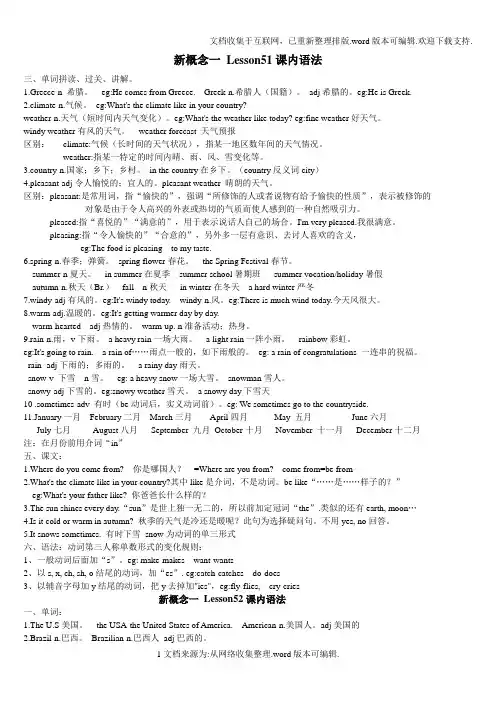
“代替”的相关英语短语“代替”一词的英文单词是replace,或者是substitute.“代替”的相关英文短语有take the place of和instead of.Instead (副词)代替(一般放句尾) Instead of (介词短语)代替(后加名词/动名词doing/what引导的宾语从句) .in place of带来;引进;提出;挣得(报酬等);生产,产生;收获;(陪审团)下(判决):bring in 代替;而不是;更换;顶替:in place of 代替;而不是:instead of ...下面我们来看一些相关例句:1.这道食谱可以用牛奶代替奶油。
You can use milk in place of cream in this recipe.《牛津词典》2.做这道菜可以用人造黄油代替黄油。
Margarine can be substituted for butter in this recipe.《牛津词典》3.做熟的四季豆可以用来代替菜豆。
Cooked kidney beans can be used in place of French beans.《柯林斯英汉双解大词典》4.他们找到了代替她的人没有?Have they found anyone to replace her yet?《牛津词典》5.她把柴油代替汽油灌入油箱,造成发动机失灵。
She put diesel fuel, instead of petrol, into the tank causing the motor to seize up.《柯林斯英汉双解大词典》6.索菲在父亲去世后没有刻意地找一个代替的人。
Sophie was not consciously seeking a replacement after her father died.《柯林斯英汉双解大词典》7.如果你找不到自发面粉,可以用普通面粉来代替。
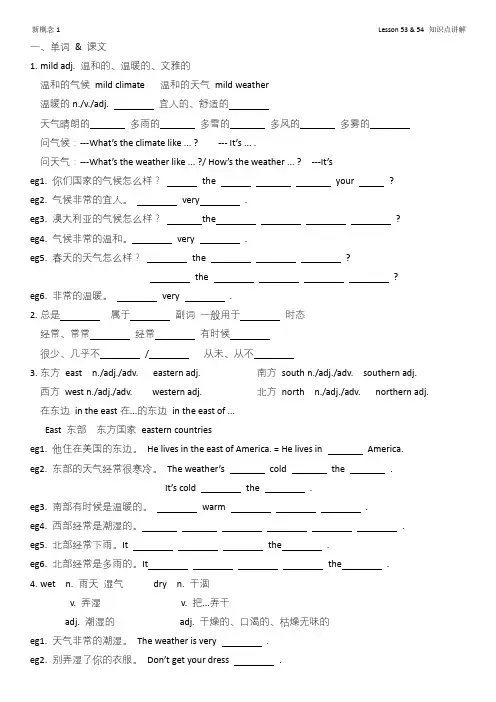
一、单词& 课文d adj. 温和的、温暖的、文雅的温和的气候mild climate 温和的天气mild weather温暖的n./v./adj. 宜人的、舒适的天气晴朗的多雨的多雪的多风的多雾的问气候:---What’s the climate like ... ? --- It’s ... .问天气:---What’s the weather like ... ?/ How’s the weather ... ? ---It’seg1. 你们国家的气候怎么样?the your ? eg2. 气候非常的宜人。
very .eg3. 澳大利亚的气候怎么样?the ? eg4. 气候非常的温和。
very .eg5. 春天的天气怎么样?the ?the ? eg6. 非常的温暖。
very .2.总是属于副词一般用于时态经常、常常经常有时候很少、几乎不/ 从未、从不3.东方east n./adj./adv. eastern adj. 西方west n./adj./adv. western adj. 南方south n./adj./adv. southern adj. 北方north n./adj./adv. northern adj.在东边in the east在...的东边in the east of ...East 东部东方国家eastern countrieseg1. 他住在美国的东边。
He lives in the east of America. = He lives in America. eg2. 东部的天气经常很寒冷。
The weather’s cold the .It’s cold the .eg3. 南部有时候是温暖的。
warm .eg4. 西部经常是潮湿的。
. eg5. 北部经常下雨。
It the .eg6. 北部经常是多雨的。
It the . 4.wet n. 雨天湿气dry n. 干涸v. 弄湿v. 把...弄干adj. 潮湿的adj. 干燥的、口渴的、枯燥无味的eg1. 天气非常的潮湿。
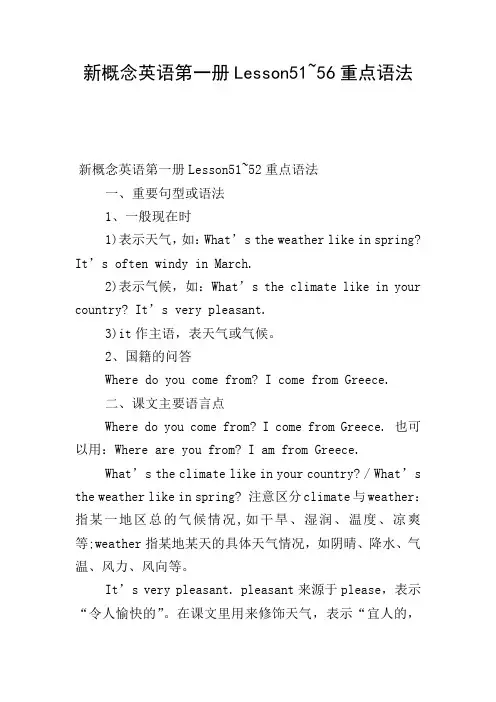
新概念英语第一册Lesson51~56重点语法新概念英语第一册Lesson51~52重点语法一、重要句型或语法1、一般现在时1)表示天气,如:What’s the weather like in spring? It’s often windy in March.2)表示气候,如:What’s the climate like in your country? It’s very pleasant.3)it作主语,表天气或气候。
2、国籍的问答Where do you come from? I come from Greece.二、课文主要语言点Where do you come from? I come from Greece. 也可以用:Where are you from? I am from Greece.What’s the climate like in your country? / What’s the weather like in spring? 注意区分climate与weather:指某一地区总的气候情况,如干旱、湿润、温度、凉爽等;weather指某地某天的具体天气情况,如阴晴、降水、气温、风力、风向等。
It’s very pleasant. pleasant来源于please,表示“令人愉快的”。
在课文里用来修饰天气,表示“宜人的,舒适的”。
It’s often windy in March. 此处可介绍表天气的名词及其形容词的变化,即在名词后加后缀-y。
此外,也可以介绍一年中12个月份的表达,可顺便介绍12个月的历史故事。
Its’ always warm in April and May, but it rains sometimes. 句中的sometimes一般位于助动词后面和实意动词前面,此处放在句末,主要是其强调作用。
What’s it like in summer? 句中的it指代天气。
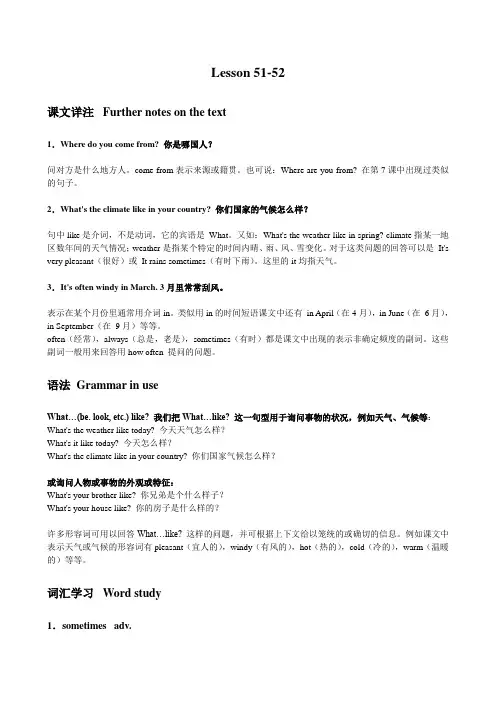
Lesson 51-52课文详注Further notes on the text1.Where do you come from? 你是哪国人?问对方是什么地方人。
come from表示来源或籍贯。
也可说:Where are you from? 在第7课中出现过类似的句子。
2.What's the climate like in your country? 你们国家的气候怎么样?句中like是介词,不是动词,它的宾语是What。
又如:What's the weather like in spring? climate指某一地区数年间的天气情况;weather是指某个特定的时间内晴、雨、风、雪变化。
对于这类问题的回答可以是It's very pleasant(很好)或It rains sometimes(有时下雨)。
这里的it均指天气。
3.It's often windy in March. 3月里常常刮风。
表示在某个月份里通常用介词in。
类似用in的时间短语课文中还有in April(在4月),in June(在6月),in September(在9月)等等。
often(经常),always(总是,老是),sometimes(有时)都是课文中出现的表示非确定频度的副词。
这些副词一般用来回答用how often 提问的问题。
语法Grammar in useWhat…(be. look, etc.) like? 我们把What…like? 这一句型用于询问事物的状况,例如天气、气候等:What's the weather like today? 今天天气怎么样?What's it like today? 今天怎么样?What's the climate like in your country? 你们国家气候怎么样?或询问人物或事物的外观或特征:What's your brother like? 你兄弟是个什么样子?What's your house like? 你的房子是什么样的?许多形容词可用以回答What…like? 这样的问题,并可根据上下文给以笼统的或确切的信息。
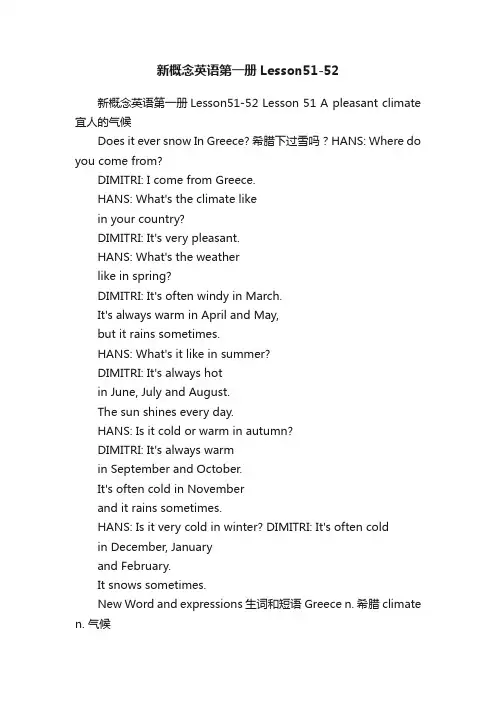
新概念英语第一册Lesson51-52新概念英语第一册Lesson51-52 Lesson 51 A pleasant climate 宜人的气候Does it ever snow In Greece? 希腊下过雪吗?HANS: Where do you come from?DIMITRI: I come from Greece.HANS: What's the climate likein your country?DIMITRI: It's very pleasant.HANS: What's the weatherlike in spring?DIMITRI: It's often windy in March.It's always warm in April and May,but it rains sometimes.HANS: What's it like in summer?DIMITRI: It's always hotin June, July and August.The sun shines every day.HANS: Is it cold or warm in autumn?DIMITRI: It's always warmin September and October.It's often cold in Novemberand it rains sometimes.HANS: Is it very cold in winter? DIMITRI: It's often coldin December, Januaryand February.It snows sometimes.New Word and expressions 生词和短语Greece n. 希腊climate n. 气候country n. 国家pleasant adj. 宜人的weather n. 天气spring n. 春季windy adj. 有风的warm adj. 温暖的rain v. 下雨sometimes adv. 有时summer n. 夏天autumn n. 秋天winter n. 冬天snow v. 下雪January n. 1月February n. 2月March n. 3月April n. 4月May n. 5月June n. 6月July n. 7月August n. 8月September n. 9月October n. 10月November n. 11月December n. 12月Lesson 52 What nationality are they ?他们是哪国人?Where do they come from ?他们来自哪个国家?New words and expressions1. the U.S. 美国2. Brazil n. 巴西3. Holland n. 荷兰4. England n. 英国5. France n. 法国6. Germany n. 德国7. Italy n. 意大利8. Norway n. 挪威9. Russia n. 俄罗斯10.Spain n. 西班牙11.Sweden n. 瑞典1、Greece n 杀腊例:I come from GreeceGreek n 杀腊人例:I am Greek.2、climate n 气候(指一个地方长期的比较固定的气候)weather n 天气(指一个时间段的天气情况,经常变化的) weather repoter天气预报/windy weather 有风的天气/What's the weather like today?今天天气怎么样?be/fill under the weather 有点不舒服,微病。
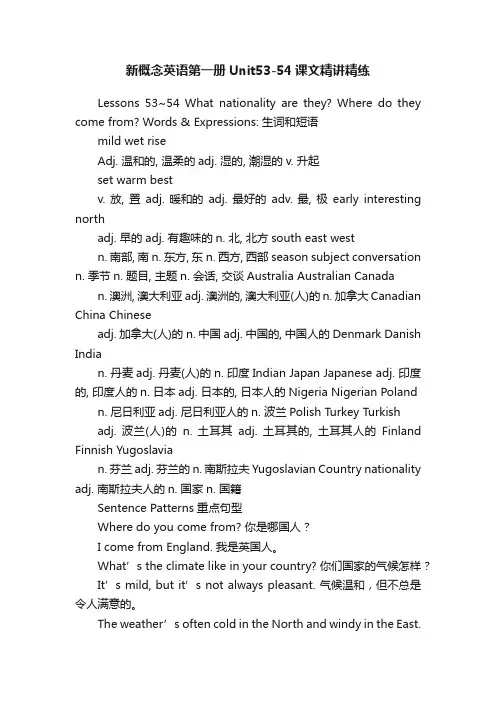
新概念英语第一册Unit53-54课文精讲精练Lessons 53~54 What nationality are they? Where do they come from? Words & Expressions: 生词和短语mild wet riseAdj. 温和的, 温柔的adj. 湿的, 潮湿的v. 升起set warm bestv. 放, 置adj. 暖和的adj. 最好的adv. 最, 极early interesting northadj. 早的adj. 有趣味的n. 北, 北方south east westn. 南部, 南n. 东方, 东n. 西方, 西部season subject conversation n. 季节n. 题目, 主题n. 会话, 交谈Australia Australian Canada n. 澳洲, 澳大利亚adj. 澳洲的, 澳大利亚(人)的n. 加拿大Canadian China Chineseadj. 加拿大(人)的n. 中国adj. 中国的, 中国人的Denmark Danish Indian. 丹麦adj. 丹麦(人)的n. 印度Indian Japan Japanese adj. 印度的, 印度人的n. 日本adj. 日本的, 日本人的Nigeria Nigerian Poland n. 尼日利亚adj. 尼日利亚人的n. 波兰Polish Turkey Turkishadj. 波兰(人)的n. 土耳其adj. 土耳其的, 土耳其人的Finland Finnish Yugoslavian. 芬兰adj. 芬兰的n. 南斯拉夫Yugoslavian Country nationality adj. 南斯拉夫人的n. 国家n. 国籍Sentence Patterns 重点句型Where do you come from? 你是哪国人?I come from England. 我是英国人。
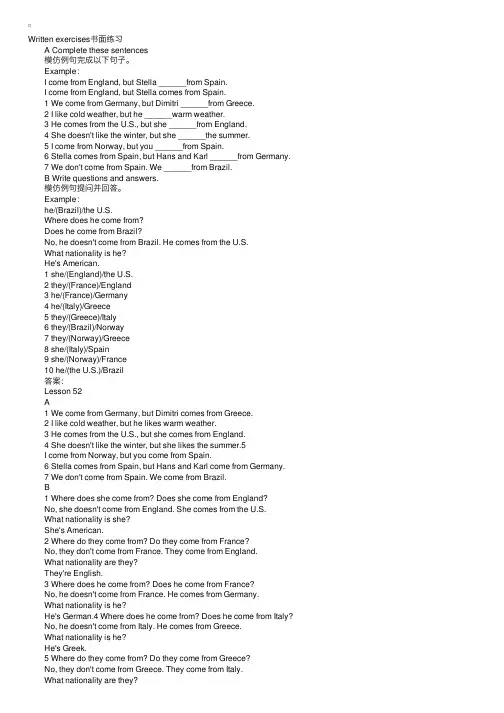
Written exercises书⾯练习 A Complete these sentences 模仿例句完成以下句⼦。
Example: I come from England, but Stella ______from Spain. I come from England, but Stella comes from Spain. 1 We come from Germany, but Dimitri ______from Greece. 2 I like cold weather, but he ______warm weather. 3 He comes from the U.S., but she ______from England. 4 She doesn't like the winter, but she ______the summer. 5 I come from Norway, but you ______from Spain. 6 Stella comes from Spain, but Hans and Karl ______from Germany. 7 We don't come from Spain. We ______from Brazil. B Write questions and answers. 模仿例句提问并回答。
Example: he/(Brazil)/the U.S. Where does he come from? Does he come from Brazil? No, he doesn't come from Brazil. He comes from the U.S. What nationality is he? He's American. 1 she/(England)/the U.S. 2 they/(France)/England 3 he/(France)/Germany 4 he/(Italy)/Greece 5 they/(Greece)/Italy 6 they/(Brazil)/Norway 7 they/(Norway)/Greece 8 she/(Italy)/Spain 9 she/(Norway)/France 10 he/(the U.S.)/Brazil 答案: Lesson 52 A 1 We come from Germany, but Dimitri comes from Greece. 2 I like cold weather, but he likes warm weather. 3 He comes from the U.S., but she comes from England. 4 She doesn't like the winter, but she likes the summer.5 I come from Norway, but you come from Spain. 6 Stella comes from Spain, but Hans and Karl come from Germany. 7 We don't come from Spain. We come from Brazil. B 1 Where does she come from? Does she come from England? No, she doesn't come from England. She comes from the U.S. What nationality is she? She's American. 2 Where do they come from? Do they come from France? No, they don't come from France. They come from England. What nationality are they? They're English. 3 Where does he come from? Does he come from France? No, he doesn't come from France. He comes from Germany. What nationality is he? He's German.4 Where does he come from? Does he come from Italy? No, he doesn't come from Italy. He comes from Greece. What nationality is he? He's Greek. 5 Where do they come from? Do they come from Greece? No, they don't come from Greece. They come from Italy. What nationality are they? They're Italian. 6 Where do they come from? Do they come from Brazil? No, they don't come from Brazil. They come from Norway. What nationality are they? They're Norwegian. 7 Where do they come from? Do they come from Norway? No, they don't come from Norway. They come from Greece. What nationality are they? They're Greek. 8 Where does she come from? Does she come from Italy? No, she doesn't come from Italy. She comes from Spain. What nationality is she? She's Spanish. 9 Where does she come from? Does she come from Norway? No, she doesn't come from Norway. She comes from France. What nationality is she? She's French. 10 Where does he come from? Does he come from the U.S.? No, he doesn't come from the U.S. He comes from Brazil. What nationality is he? He's Brazilian.。
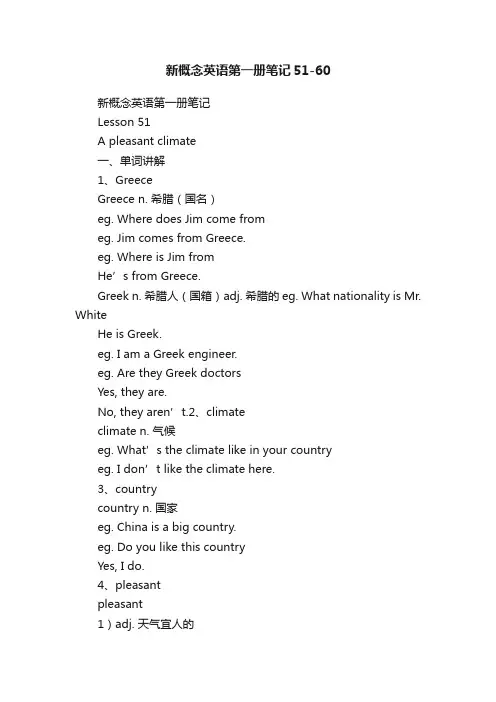
新概念英语第一册笔记51-60新概念英语第一册笔记Lesson 51A pleasant climate一、单词讲解1、GreeceGreece n. 希腊(国名)eg. Where does Jim come fromeg. Jim comes from Greece.eg. Where is Jim fromHe’s from Greece.Greek n. 希腊人(国箱)adj. 希腊的eg. What nationality is Mr. WhiteHe is Greek.eg. I am a Greek engineer.eg. Are they Greek doctorsYes, they are.No, they aren’t.2、climateclimate n. 气候eg. What’s the climate like in your countryeg. I don’t like the climate here.3、countrycountry n. 国家eg. China is a big country.eg. Do you like this countryYes, I do.4、pleasantpleasant1)adj. 天气宜人的eg. It’s quite pleasant today.2)adj. 令人愉悦的eg. What a pleasant surprise! 多么好的一个惊喜呀!eg. The flower gives off a pleasant smell. 这支花散发出一种令人愉悦的香味。
3)adj. 可亲的,友好的eg. Her mother is a pleasant woman.eg. Wendy is very pleasant.a pleasant smile4、weatherweather n. 天气(短时间内天气变化)climate n. 气候(长时间的天气状况)eg. What’s the weather like todaygood weather 好天气=nice weather weather forecast 天气预报weather bureau 气象局under the weather:not very well or happy 感觉不是很好或不是很高兴weather beaten:岁月侵蚀的,饱经风霜的the weather beaten rocks:风雨侵蚀的岩石a weather beaten face:沧桑的脸4、springspring1)n. 春季eg. My father likes spring.eg. Do you like springYes, I do.No, I don’t.2)n. 弹簧5、windywindy adj. 有风的eg. What’s the weather like todayeg. It’s windy.wind n. 风eg. There is much wind today. 今天风很大。
新概念英语第一册Lesson51~54生词和短语新概念英语第一册Lesson51生词和短语Greece /gri:s/ n. 希腊snow /snəu/ v. 下雪Climate /'klaimit/ n. 气候January /'dʒænjuəri/ n. 1月country /'kʌntri/ n. 国家February /'februəri/ n. 2月pleasant /'plezənt/ adj. 宜人的March /ma:tʃ/ n. 3月weather /'weeə/ n. 天气April /'eiprəl/ n. 4月spring /spriŋ/ n. 春季May /mei/ n. 5月windy /'windi/ adj.有风的June /dʒu:n/ n. 6月warm /wɔ:m/adj. 温暖的July /dʒu'lai/ n. 7月rain /rein/ v. 下雨August /'ɔ:gəst/ n. 8月sometimes /'sʌmtaimz/ adv. 有时September /sap'temb'ə/ n. 9月summer /'sʌmə/ n. 夏天October /ɔk'təubə/ n. 10月autumn /'ɔ:təm/ n. 秋天November /nəu'vemb/ n. 11月winter /'wintə/ n. 冬天December /di'sembə/ n. 12月新概念英语第一册Lesson52生词和短语the U.S.美国Italy /'itəli/ n. 意大利Brazil /brə'zil/ n.巴西Norway /'nɔ:wei/ n. 挪威Holland /'hɔlənd/ n. 荷兰Russia /'rʌʃə/ n. 俄罗斯England /'iŋglənd/ n. 英国Spain /spein/ n. 西班牙France /'fra:ns/ n.法国Sweden /'swi:dn/ n. 瑞典Germany /'dʒə:mni/ n. 德国新概念英语第一册Lesson53生词和短语mild /maild/ adj. 温和的,温暖的night /nait/ n.夜晚always /'ɔ:weiz/ adv. 总是rise /raiz/ v.升起north /nɔ:θ/ n. 北方early /'ə:ii/ adv.早east /i:st/ n. 东方set /set/ v.(太阳)落下去wet /wet/ adj. 潮湿的late /leit/ adv. 晚,迟west /west/ n.西方interesting /'intristiŋ/ adj. 有趣的,有意思的south /sauθ/ n. 南方subject /'sʌbdʒikt/ n. 话题season /'si:zən/ n.季节conversation /'kɔnvɔ'seiʃən/ n. 谈话best /best/ adv.最新概念英语第一册Lesson54生词和短语Australia /ɔs'treilʃə/ n. 澳大利亚Japan /dʒə'pæn/ n. 日本Australian /ɔs'treiljən/ n. 澳大利亚人Nigeria /nai'dʒiəriə/ n. 尼日利亚Austria /'ɔstriən/ n. 奥地利Nigerian /nai'dʒiəirən/ n. 尼日利亚人Austrian /'ɔstriən/ n. 奥地利人Turkey /'tə:ki/ n. 土耳其Canada /'kænədə/ n. 加拿大Turkish /'tə:kiiʃ/ n. 土耳其人Canadian /kə'neidiən/ n. 加拿大人Korea /kə'riə/ n. 韩国China /'tʃainə/ n. 中国Polish /'pəuliʃ/ n. 波兰人Finland /'finlənd/ n. 芬兰Poland /'pəulənd/ n. 波兰Finnish /'finiʃ/ n. 芬兰人Thai /tai/ n. 泰国人India /'indiən/ n. 印度Thailand /'tailənd/ n. 泰国Indian /'indiən/ n. 印度人。
新概念一册lesson51-60单课练和参考答案Lesson 51-52一、填写单词所缺字母。
1. _ct_ber2. sp_ _ng3. D_c_mber4. w_ _ter5. s_mmer6. clim_te7. pleas_nt 8. aut_m_ 9. Febr_ _ _y10. w_ _ther二、根据句意和首字母提示完成下列句子。
1. It’s always warm in A_________ and M________ but it rains sometimes.2. It’s often cold in D___________ J___________. It snows sometimes.3. They’re English. They come from E_____.4. He’s Greek. He comes from G_________.5. We’re French. We come from F________.6. You are German. You are from G_______.7. She’s Dutch. She comes from H________.8. I’m Norwegian. I come from N________.9. They are Spanish. They come from S____.10. They are Swedish. They come from S__________.三、用所给单词的适当形式填空。
1. We __________ (like) English very much.2. Jim __________(come) from England.3. Does she ________ (want) any meat?4. They don’t ________ (come)from Japan.5. It doesn’t ________ (rain) in winter.6. Can you _____ (see) some birds in the sky?7. He is ______ (sit) on the grass.8. Can you _______ (make) biscuits?9. Are they _________ (work) hard?10. She isn’t ________ (read) a magazine.四、改错。
Lesson 51 --------52二.选择( C )1.I ’ d like to go with you,____I ’ m busy.A.andB.orC.but详解:我想和你一起去,但是我很忙( C )2.-----What is the ____like today?------Cloudy.A.skyB.airC.weather详解:今天的天气如何?多云Weather 天气( A )3.---- What’ s the weather going to be like next week?---- It ’ s going to be___A.wetB.darkC.long详解:下个星期天气怎么样?要下雨了。
Wet 形容词,潮湿的,下雨的。
( B )4.____is spoken the most widely in the world.A.ChineseB.EnglishC.French详解:英文是世界上使用率最广泛的。
()5.____weather it is!A.What a fineB.How fineC.How fine the 详解: what+a/an+形容词 +名词 +主语 +谓语what +形容词 +不可数名词 +主语 +谓语How+ 形容词 +主语 +谓语此句话翻译:多好的天气啊,有两种表达方式,因为天气是不可数名词。
1.What fine weather it is .2.How fine the weather is.此道题选项出问题了,没有可以选择的选项。
( B )6.---We never know ___he is from.-----They say they comes from Italy.A.whomB.whereC.which详解:我从来不知道他来自于哪里。
他们说他们来自于意大利。
( B )7.September 10th is _____in China.A.Teacher ’ s DayB.Teachers’DayC.Teachers Day 详解:九月十日是中国的教师节教师节: Teachers’s Day( B )8.Which season do you like ____,spring or summer?A.wellB.betterC.best详解:你更喜欢哪个天气,春天还是夏天。
Lesson 51-52课文详注Further notes on the text1.Where do you come from? 你是哪国人?问对方是什么地方人。
come from表示来源或籍贯。
也可说:Where are you from? 在第7课中出现过类似的句子。
2.What's the climate like in your country? 你们国家的气候怎么样?句中like是介词,不是动词,它的宾语是What。
又如:What's the weather like in spring? climate指某一地区数年间的天气情况;weather是指某个特定的时间内晴、雨、风、雪变化。
对于这类问题的回答可以是It's very pleasant(很好)或It rains sometimes(有时下雨)。
这里的it均指天气。
3.It's often windy in March. 3月里常常刮风。
表示在某个月份里通常用介词in。
类似用in的时间短语课文中还有in April(在4月),in June(在6月),in September(在9月)等等。
often(经常),always(总是,老是),sometimes(有时)都是课文中出现的表示非确定频度的副词。
这些副词一般用来回答用how often 提问的问题。
语法Grammar in useWhat…(be. look, etc.) like? 我们把What…like? 这一句型用于询问事物的状况,例如天气、气候等:What's the weather like today? 今天天气怎么样?What's it like today? 今天怎么样?What's the climate like in your country? 你们国家气候怎么样?或询问人物或事物的外观或特征:What's your brother like? 你兄弟是个什么样子?What's your house like? 你的房子是什么样的?许多形容词可用以回答What…like? 这样的问题,并可根据上下文给以笼统的或确切的信息。
例如课文中表示天气或气候的形容词有pleasant(宜人的),windy(有风的),hot(热的),cold(冷的),warm(温暖的)等等。
词汇学习Word study1.sometimes adv.有时,间或:It is sometimes hot and sometimes cold. 天气时冷时热。
Sometimes he visits his aunt who lives nearby. 他有时会去看望他那住在附近的婶婶。
2.pleasant adj.(1)令人愉快的;舒适合意的:The climate in my hometown is always pleasant. 我家乡的气候总是宜人而舒爽。
This study is pleasant to work in. 在这个书房里工作令人感到舒适。
(2)(人或其外表、举止等)讨人喜欢的;(性情等)和蔼可亲的:She's such a pleasant girl. 她真是个可爱的姑娘。
Andrew seemed very pleasant on the phone. 安德鲁在电话里显得很和蔼可亲。
Lesson 53-54课文详注Further notes on the text1.in the North=in the north of England.North的首字母大写,是因为它单独使用,特指英国的北部。
表示一个国家或地区的方位词一般要大写。
本课中的方位词均表示国家的一部分:in the East 在东部in the West 在西方in the South 在南方但是,仅仅表示方位意义的方位词不需大写。
如:a north wind 北风a south window 南窗2.Which seasons do you like best? 你最喜欢哪些季节?句中的best是副词well的最高级,作状语,修饰like。
3.The sun rises early and sets late. 太阳升得早而落得晚。
句中的early和late都是副词,分别修饰动词rises和sets,作状语。
注意the sun中定冠词的用法。
在英语中,表示世界上独一无二的东西(如太阳、月亮、世界、地球、天空、宇宙)的名词之前通常需加定冠词。
4.favourite subject of conversation, 最喜欢谈论的话题。
英国人见面时谈话通常是从天气开始的。
一方面这与英国的自然地理情况有关,另一方面则与英国人的民族性格有关。
谈论天气是任何人都可接受的话题,而且这可避免介入令人尴尬的或侵入私人领域的话题。
语法Grammar in use1、like (v.)与like (prep.)like(v.)表示“喜欢”、“想要”(请参见Lessons 47~48词汇部分),而like(prep.) 表示“像……一样”:His car is like mine. 他的汽车跟我的那辆一样。
She is very like her sister. 她和她姐姐相像极了。
The new building looks like a big bird. 那座新建筑看上去像是一只大鸟。
词汇学习Word study1.mild adj.(1)(天气等)温暖的;暖和的:They had an exceptionally mild winter last year. 他们那儿去年冬天出奇地暖和。
The climate in the South is always mild and pleasant. 南方的气候总是温和宜人。
(2)(性情等)温和的:John is a mild man who never raises his voice. 约翰是一个温和的人,他从不抬高嗓门说话。
I like his gentle and mild voice. 我喜欢他那温和而轻柔的声音。
(3)(食物等)味淡的:Try this mild curry. 试试这种淡味咖喱。
He likes to smoke mild cigars. 他喜欢抽淡味雪茄烟。
2.rise v.(1)(日、月等)升起;上升:The sun rises in the east. 太阳从东方升起。
The curtain rises at 8.00 p. m. 剧在晚上8点钟开演。
(2)(河水、物价、温度等)上涨;升高;增加:The level of the river is still rising. 河水水位仍在上涨。
(3)起身;起床:My mother always rises early. 我母亲总是很早起床。
The house rose to the singers. 全场起立向歌唱演员们致意。
Exercises1.Fill in each blank with the most appropriate word(用恰当的词填空)1. Those girls aren’t Chinese. They come from Germany. They’re ______________.2. That is my English magazine. Give it to ___________, please.3. --- Is there __________ milk on the table? --- No, there isn’t.4. In our villa ge all the shops aren’t ___________ at lunchtime. They are closed.5. --- Is that bag heavy? --- No, i t isn’t. It is quite ___________.6. Helen’s computer is __________ her closet. It doesn’t work n ow.7. --- What are you ___________? --- I’m washing my clothes.8. I’ve got a bad cold. I t hink I must go and see a ______________.9. The sun rises in the east and sets in the ___________.10. My husband doesn’t like bananas. I don’t like bananas, ___________.11. Are you going to the ___________? We need some salt and a bottle of milk.12. Mike is a sales rep, He ___________ bicycles at a big store.13. As soon as the alarm clock rings every morning, I get up at _____________.14. In the photograph we can see the little boy is standing ________14____ hermother and her father.15. I don’t like milk in my coffee. I like ____15_______ coffee.16. --- Is that tin of tobacco ______16_____ me,?--- Yes, but smoking is not good for our health.17. I like sports very much. Swimming is my ________17_____ sport .I love it best.II、Finish the following passages with appropriate words (用适当的词完成下列短文)A. Write in a or an: (用a或者an 填空)My friend John is ___________ engineer and his wife Susan is ______________ teacher.They have two daughters, Anna and Christine. They are not children. Anna is _________ air hostess and Christine is _________ hairdresser. Anna has ___________ Italian car, butChristine has _________ English bicycle. They don’t live with their parents. They havetheir own apartments.B. Write in be in the right form: (用am, is, are填空)Mrs. Smith’s kitchen _________ small. There _________ a refrigerator in the kitchen.The refrigerator _________ white. It ________ on the right. There ____________ anelectric cooker in the kitchen. There _______ some cups near the cooker. The cups _______ clean. There _________ a table in the middle of the room. There ________ two armchairs beside the table. The armchairs _________ very beautiful.C. Write in proper prepositions: (用适当的介词填空)Here is a photograph __________ our village. My wife and I are walking __________ thebanks ______________ the river. We are _________ the left.Ⅲ. Talk about the climate of your hometown .。